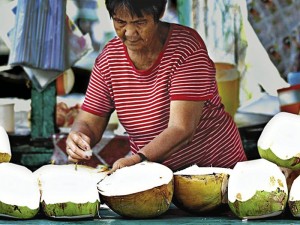By: Winston A. Marbella
Philippine Daily Inquir
NATURAL PACKAGING . Coconut vendors in Lucena City expect brisk business after President Aquino noted after his arrival from the US on Friday that fit-conscious Americans are going cuckoo over coco water. DELFIN MALLARI JR./INQUIRER SOUTHERN LUZON
Mesmerized by the coconut juice craze sweeping the American market (mostly coming from other coconut-producing countries), President Aquino is encouraging Philippine companies to cash in on the fad.
The coconut industry, particularly representatives of the poorest farmers, are not exactly jumping for joy. It is not hard to understand why, if we just spend a little time going a little deeper than the surface of the economics of the coconut inbdustry.
But first a sound bite from the buko (young coconut) vendor that plies the streets with his cart (always a good place to start). An enterprising television news channel had the journalist’s nose for news to seek out the vendor’s opinion on the President’s Aha! Moment, which is really the opinion that counts here. The vendor, speaking in Filipino, said he worried that exporting buko juice would drive up the cost of his buko from P10 to P15 apiece.
The beauty of street economics is that it is easy to understand—and is normally right on the button. The poor man knows how much every peso is worth, for he can literally feel it in his gut.
It grows on trees
Now, for the more elaborate economics. Joey Faustino, executive director of the Coconut Industry Reform (COIR) Movement, says it is doubtful if the investments will benefit the “impoverished millions of coconut farmers and their families that comprise a third of the Filipino population.”
While on a working visit to the United States last week, President Aquino announced that two US companies—Pepsi Cola and Vita Coco—were planning some $15 million in new investments in the coconut industry to meet a growing international demand for coconut water.
The impact of the coconut industry on Filipino lives is staggering. Fully a third of the population derives income from the industry. More than a fourth of the country’s total agricultural lands (or some 3.37 million hectares) are planted to coconuts, according to industry figures.
In Quezon province alone, some 304,000 farmer-families till 388,664 hectares of coconut lands. There are over 3.4 million farmer-families who depend on coconut. Its effect on consumer purchasing power is so pervasive that San Miguel Corporation tracks farm gate prices to forecast beer sales.
When the harvest is good and prices are high, farmers consume more beer, considered a premium drink in the rural areas (not buko juice). When prices are low, farmers shift down to gin, rum, or local spirits like lambanog, which is fermented from—you guessed it!—the sap of the coconut tree.
Economics of scarcity
The reason the industry is not overjoyed over the President’s good news is that there is actually a lack of coconuts to meet demand. I know of at least one cooking oil company scrounging for raw material for its refineries, which are operating at less than efficient capacities.
The raw material is needed not only for making cooking oil, for which we can hardly supply international demand. Coconut also provides the raw material for dessicated coconut (coconut milk) and, more profitably, coco sugar, which is healthier than cane sugar, especially for diabetics.
Coco sugar will yield P14,000 per hectare per month, while dessicated coconut yields P8,000 and coconutoil (from copra) about the same, according to industry sources.
Economies of scale
Converting the land to palm oil may yield P12,000, but a minimum size of 25 hectares is needed to generate the economies of scale to operate a palm oil refinery efficiently, compared to an average five hectares for a coconut farm to be viable.
All told, the country does not have enough coconut trees to supply current demand for its products. And because it takes anywhere from three to five years for trees to be really productive, the solution is to plant more trees now, not to sell more buko juice, industry sources say.
The story is told that while a sweltering Napoleon was marching his armies to conquer more territory for the French empire, he noted that his troops could cover more ground if the Romans had thought of planting more trees along the roads that led to Rome. In the shade, Napoleon mused, the troops could march longer. A lieutenant protested: “But, my general, it will take years to grow those trees!”
Replied Napoleon: “In that case then, we better begin planting now.”
Buko juice economics requires that first of all we must know how to use our coconut.
No comments:
Post a Comment